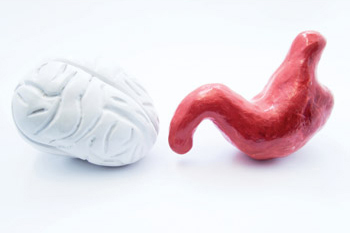Addressing the gut-brain connection in IBS
While psychotherapies are effective treatments for some digestive disorders, stigma around both functional gut disorders and mental health diagnoses limits uptake, both for physicians and patients.
Some patients with irritable bowel syndrome (IBS) and other functional GI conditions may feel shamed rather than supported.
In one study, patients with IBS were more likely than those with inflammatory bowel disease to report that their doctors did not take their symptoms seriously, did not have enough knowledge about the gut-brain connection, and told them that the symptoms were all in their heads, according to results published in the February 2017 Neurogastroenterology & Motility.

Psychogastroenterology is an emerging field that applies psychological science and practice to help address the gut-brain connection in patients with gastrointestinal conditions. But while these psychotherapies are effective treatments for digestive disorders, the stigma around both functional gut disorders and mental health diagnoses limits uptake, said Laurie A. Keefer, PhD, associate professor of medicine at the Icahn School of Medicine at Mount Sinai in New York City, where she directs psychobehavioral research within the division of gastroenterology.
“It's up to the physicians, I think, to really convince the patients. … We're much more likely to see patients participate if their physician has recommended it,” she said.
At a session called “Behavioral Assessments and Treatments for the Gastroenterologist” at Digestive Disease Week, held this May in San Diego, Dr. Keefer explained how to credibly talk to patients about behavioral interventions targeted to GI conditions. “You really want to be able to develop that elevator pitch, or that convincing rationale, to ensure the uptake from your patients, because that's the most important part,” she said.
Who might benefit?
Physicians should start by routinely asking patients about their quality of life, symptom anxiety, and impairment at each visit, said Dr. Keefer. In addition, before doing any workup, they should bring up the role of behavioral therapy as one of several treatment options, she said.
“If you don't, it seems like, ‘We worked you up, we can't find anything, there's nothing wrong with you, go see the psychologist,’ and we really don't want the messaging to be that this is a last-ditch effort,” said Dr. Keefer, adding that even if physicians refer to a psychologist, they should assure the patient that they will still be coordinating care.
Of course, questions might arise. She offered tips on how to address two common things patients might be wondering about gut-brain therapies.
First, many patients ask their physicians, “Does stress cause my symptoms?” Of course, the true answer isn't a simple yes or no, Dr. Keefer said. “You could ask the patient, ‘What do you think?’ … Often, patients will be able to give you some kind of a gray answer that you can capitalize on when you're explaining the brain-gut rationale.”
An alternative is to explain that everyone has stress and that while it may not be causing symptoms, it certainly plays a role, and the symptoms themselves can sometimes be the stressor, said Dr. Keefer. “It's also helpful to tell patients that digestive disorders are some of the most stress-sensitive disorders that we have, so it would make sense that if you already have a gastrointestinal condition, you need to be more proactive than normal in managing your stress,” she said.
Virtually every doctor has heard the other question: “Are you saying it's all in my head?” “Patients tell us psychologists all the time that they heard that message from their doctor, and it's important that we make sure that patients don't walk away thinking about that,” said Dr. Keefer.
However, when talking to patients, it's worth noting that “Everything is in our head,” she said. “Patients can often appreciate that we say, ‘You really can't disconnect the brain from the rest of the body, so of course things are in your head.’” Dr. Keefer suggested explaining to patients that the brain is doing its job by alerting them to sensations of pain, discomfort, or other symptoms. “But sometimes, after those are treated, the brain continues to falsely alert you that something is wrong, and that's the process that brain-gut psychotherapy can help us with,” she said.
One of the main therapeutic targets of brain-gut therapies is hyperarousal, because there is a strong correlation between heightened arousal and GI motility, Dr. Keefer said. Other targets include attentional bias and somatization, difficulties with modulating pain, symptom-specific fear and avoidance, catastrophizing, and extraintestinal symptoms (e.g., inflexible coping and acceptance), she added.
Of note, all of the treatment targets are agnostic to the GI condition and its subtypes. “If you take IBS, for example, it doesn't matter if the patient's constipated or has diarrhea or is mixed type because these interventions are targeting central processes that drive symptom perception. … These therapies really give you an opportunity to step aside and offer something that's a little bit more comprehensive,” Dr. Keefer said.
Patients who are most likely to benefit from brain-gut therapies are those who have been told by a clinician that they have a disorder of gut-brain interaction, she said. The best candidates are open to the possibility of behavior change to alleviate their symptoms, have time to participate in therapy, and agree that their coping skills could be improved, Dr. Keefer said.
On the other hand, patients with severe depression or other serious psychopathology are unlikely to benefit. “[They are] probably better treated by experts in those areas,” she said. “We're experts in GI; other people are experts in depression and anxiety.” Other unlikely candidates are those with active substance use disorders, personality disorders, or ongoing eating disorders, as well as those who are focused on a “cure” or are unable to commit to treatment, Dr. Keefer said.
Evidence-based therapies
The brain-gut psychotherapies with the most evidence to treat functional GI symptoms are cognitive behavioral therapy (CBT) and gut-directed hypnotherapy, Dr. Keefer said. “You have two very robust, evidence-based treatments that you can talk to patients about.”
More than 30 randomized controlled trials of CBT and 12 of gut-directed hypnotherapy have yielded numbers needed to treat of four and three, respectively, according to a systematic review and meta-analysis published in the September 2014 American Journal of Gastroenterology. About 50% of patients who receive CBT and about 70% of patients who receive gut-directed hypnotherapy have a 50% drop in IBS symptoms, with long-term skills maintenance lasting about four and six years, respectively.
Most of the time, both CBT and gut-directed hypnotherapy are a three-month commitment, and each can be delivered as individual, group, online, or home-based therapy, Dr. Keefer noted. CBT is led by a trained therapist, and there are also self-help materials, whereas gut-directed hypnotherapy can be provided by physicians, nurse practitioners, physician assistants, and trained therapists, she said.
CBT has multiple associated techniques, such as psychoeducation, self-monitoring, relaxation, cognitive restructuring, exposure, problem solving, habit reversal, mindfulness, and contingency management. Its main therapeutic targets are hyperarousal/autonomic functioning, avoidance behaviors, pain catastrophizing, symptom-based fear, inflexible coping, and acceptance, Dr. Keefer said. “The ideal patient for CBT would be somebody who has psychological insight, has some cognitive flexibility and is able to change, and can maybe give you in the office clear examples of triggering or exacerbating events,” she noted.
Hypnosis, by definition, is a sensation of relaxation, but the key ingredients in gut-directed hypnotherapy are the suggestions that the therapist makes after the patient is in a relaxed, focused state, Dr. Keefer said. Its main targets are hyperarousal/autonomic functioning, attentional bias to bodily sensations, somatization, modulating pain and hyperalgesia, and extraintestinal symptoms. “A lot of times, when patients have multiple extraintestinal symptoms in addition to their GI condition, my preference is hypnosis,” she said, adding that candidates for hypnotherapy tend to be open and somatically oriented.
If a physician is unable to refer a patient for psychotherapy, Dr. Keefer offered two quick ways to be effective in the office.
One strategy that takes less than three minutes is to teach patients how to do diaphragmatic breathing, a relaxation technique, she said. “You have them inhale four seconds and exhale six,” said Dr. Keefer. “You want to make sure that they put their hand on their heart and their other hand on their abdomen and that they're able to expand their abdomen and not raise their chest.” The second strategy is to become familiar with one tricyclic antidepressant or selective serotonin reuptake inhibitor: dosing, side effects, how to increase the dose, and how to monitor patients, she said.
Overall, physicians who ask patients about their quality of life, talk about the brain and gut effectively, and are able to recommend brain-gut psychotherapies will help decrease the stigma around functional gut disorders, Dr. Keefer concluded.





